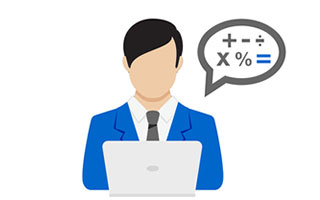Thinking of starting a business or becoming self-employed?
Between 2001 and 2019 over 1.5 million people became self-employed, with around one in eight people earning their living this way.

So, are you ready to take the plunge?
We’ll be honest it can be quite daunting as there are so many things to think about;
- Business structure
- Budgeting
- Paying your tax
- And more…
In this blog, you’ll discover the pros and cons of being your own boss, keeping accurate records and helpful tips for you, should you take the plunge and become self-employed.
Where do you start when thinking of setting up a business or becoming self-employed?
It can be very rewarding:
- Something that interests you or what you’re passionate about is a must.
- Think about your working hours.
- Working around other commitments i.e. children.
- Being in control over your income.
There are some downsides too:
- You’ll find it’s not always 9-5 and weekdays.
- Coping with irregular income.
- Doing your bookkeeping and tax returns. (unless you employ an accountant)
- Having no access to employment benefits such as paid or sick leave.
What are the different kinds of self-employed businesses?
One of the first things you will need to think about is what your business structure will be?
Sole trader
By far the simplest business structure. You are your own business as an individual and will keep all after-tax profits.
A key point here is, your personal and business assets are not considered separate. Meaning you’re personally responsible for any debts associated with your business. By taking out business insurance, you can reduce this. Alternatively, choose one of the other business structures below.
Don’t be put off by the idea of being a sole trader. It’s just that you are one person, working for yourself.
If you decide to be a sole trader, you simply register as self-employed with HM Revenue & Customs (HMRC).
Partnership
As the name suggests, a partnership is if you decide to go into business with one or more people and have shared responsibility for the business.
It’s very important you have a partnership agreement drawn up, so all involved know how the profits are to be split.
Any business debts are dealt with by what is known as ‘Joint and Several Liability’. All members of the business partnership are responsible for any debts either in full or individually, depending on what you and they can afford to repay.
A Self-Assessment tax return will need to be submitted by all partners for their share of the profits, and a nominated partner will need to be appointed to submit a partnership Self-Assessment for the business.
Private limited company (Ltd)
A private limited company (Ltd), is an own legal entity and is completely separate from you as the business owner running it. You will need to be registered (or incorporated) with Companies’ House with a suitable name and an address.
The company will have a director (this will be you, as you’re the person starting the business) who will be legally responsible for running the company, plus at least one shareholder (known as a member).
As a Ltd company, you will have to pay corporation tax on any profits, and the after-tax profits are then divided up among the shareholders.
Your company will need to submit its annual accounts to Companies’ House and a tax return to HMRC. A Self-Assessment tax return will also need to be completed, but you will only pay tax on the money earned by running the company, not any profits.
Limited partnership
If you decide to go with a limited partnership, you must have at least one general partner and one limited partner. The general partner will be responsible for running the business and the partnerships’ debts. The limited partner will only be liable for the amount they originally invested in the business.
Limited liability partnerships (LLP)
LLPs are a combination of a limited company and a partnership. Like in the instance of a partnership, you can set up your business with two or more people, but like an Ltd, you must be incorporated with Companies’ House, have a name and address and is legally separate from the people running it.
Your company must also have at least two shareholders and each shareholder with have to pay tax on their share of the profits. The liability for the partners with any business debts is limited to the amount of any money they’ve invested.
So, what do you need to do when starting a business and becoming self-employed?
There are quite a lot of things you will need to consider. This is not a complete list, but it will help cover some of the major areas you need to start thinking about.
Draw up a budget
First and most importantly, you need to draw up a budget. Start thinking about all the costs it’s going to take to get your business up and running, such as:
- Renting business premises (if needed) and costs associated with it, like electricity and telephone/internet access.
- Buying or hiring vehicle(s) plus the cost of fuel and maintenance.
- Equipment such as computers/printers and phones.
- Being online with a website and hosting costs associated.
- Advertising and marketing materials.
- Team members.
But remember, you might not need all of the above. Many profitable businesses have no need for physical premises.
You may already have the equipment you need and staff might be an unnecessary luxury at this point until your business is more established.
However, you will need to think about your personal costs like rent, mortgage, utility bills, food and childcare if applicable.
You will also need to think about how much of your money you can afford to invest. This will determine if you will need to look for investment or even a business loan.
Business plan
There are two important reasons for writing a business plan:
- So you can set out your business objectives along with developing your ideas and plan for the short and medium-term.
- This is your blueprint when presenting to people outside your business, like banks or potential investors if you’re looking to raise money.
When you’re presenting, it’s important to be realistic and transparent about your costs and earning potential.
To help your case, make sure it looks professional, is well structured and contains all the relevant information people would expect to see.
Paying taxes
You will need to register for Self- Assessment to pay your own taxes when the time comes.
Tax and National Insurance on your self-employed earnings are in arrears. This means any tax you owe on money earned in the 2019/20 tax year will not be due until January 2021.
Plan ahead about how you will pay what could be a substantial bill. You should have a good idea of how much tax you will owe from the end of the previous tax year. The good news is you will have nine months to prepare.
If you’ve decided to set up as a private limited company (Ltd) or limited liability partnership (LLP) you will need to pay corporation tax on profits made.
Registering for VAT
If your business in time has a taxable turnover of £85,000 or more, you will need to be VAT registered. In some cases, businesses can benefit from registering for VAT even if their turnover is below this threshold.
If and when you become VAT registered, you will need to charge VAT on all the goods and services you provide. With this also means you’ll have additional paperwork too complete.
This enables you to claim back any VAT you pay for services or goods relating to your business.
Record keeping
You will need to get to grips with record-keeping quickly when becoming self-employed.
Make sure you keep track of what you’re charging clients for your services and goods, plus any business-related expenses.
These records include bank statements, invoices, receipts and if applicable all till rolls.
You don’t need to send these when you submit your tax return. However, these records will need to be kept for five years after the relevant tax return submission deadline. For example, for your 2019/20 tax return, you will need to keep your records until 31 January 2025.
Traditional accounting vs cash basis
If you are a sole trader or in a partnership and have a combined annual turnover of less than £150,000, you can choose to use cash basis accounting, rather than traditional accounting.
Traditional accounting means you pay tax and claim expenses from any invoices or billing dates.
Should you choose to use cash basis accounting, you can pay tax and claim expenses based on when any money leaves or enters your business bank account.
Why would this matter?
If you’re getting paid for your services or goods on a monthly basis, then there’s probably very little difference. But, if in the agreement you invoice someone for work months before you’re due to get paid then it can change the year you pay tax on that particular income.
For example, in traditional accounting if you invoice someone in March 2020, but you’re not due to get paid until July 2020, you will have to declare this income in your 2019/20 tax return and pay the tax on it no later than January 2021.
In cash basis, you will have to declare this income for the tax year you got paid, which would be 2020/21. This means you won’t pay any tax on this until January 2022.
However, in cash based accounting there are some downsides. For example, you won’t be able to offset losses against your taxable income or claim on interest costs of more than £500, so you should seek advice about what option is best for you and your business.
Will you need a business bank account?
Not if you’re a sole trader or in a partnership, but, we strongly advise you have one as you’ll find it useful to keep your business and personal finances separate, especially if you’re in a partnership.
For a limited company, you will need to have a business bank account.
As with personal accounts, business bank accounts have some different features. You can compare and see what’s best for you and your business at:
Bookkeeping software
If you could do with some advice with your record and bookkeeping, then please get in touch for jargon-free advice or request a callback.
Personal and business insurance
When running your own business, you need to make sure you have business insurance, such as public liability and equipment insurance, there is a wide range of products available.
If self-employed you no longer have an employer to fall back on for any sickness days or health insurance, you should also consider a personal insurance policy.
Will you need an accountant?
There is no definitive answer to this question. But if your business is brand new and you have a simple financial situation, we suggest you look to manage it by yourself, at least in the short term.
However, hiring an accountant can be a good thing as they can provide advice on tax planning, offsetting expenses against income and it also doesn’t need to be expensive.
If you’re looking at hiring an accountant now or in the future, please make sure they’re registered with the Financial Conduct Authority (FCA) and also a member of the relevant trade body, the Institute of Financial Accounts (IFA).
Should you need any assistance or jargon-free advice on your options for setting up your business venture then contact the team at The Buxton Partnership.



